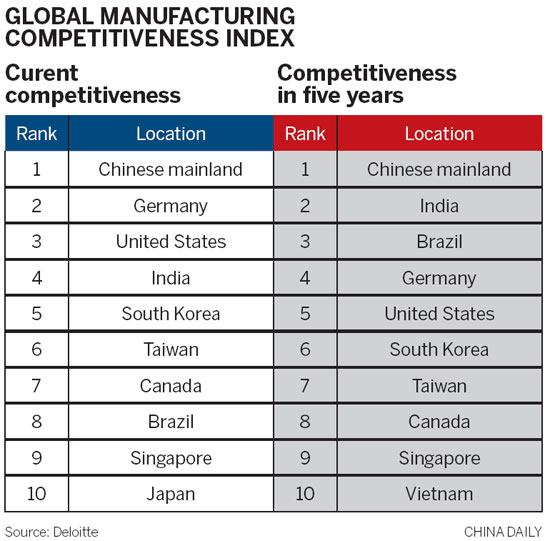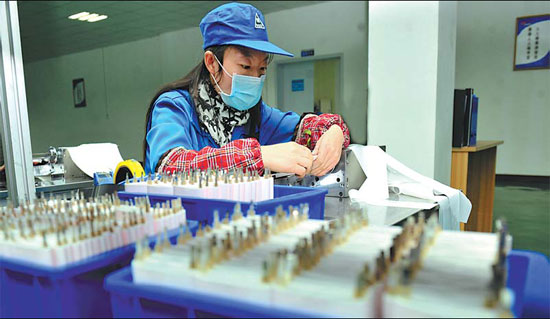China holds competitive edge
|
A worker assembles environmentally friendly lithium batteries at an industrial park in Yichang, Hubei province. A survey found that China retains first place in terms of competitiveness in manufacturing, followed by Germany and the United States. Zhang Guorong / For China Daily |
Nation to remain top location for manufacturers for next five years
Despite rising labor costs and an aging population, China is still regarded as the top destination for manufacturing, and will retain this top spot over the next five years, according to an international survey released on Tuesday.
The survey, co-launched by Deloitte Touche Tohmatsu Ltd and the United States Council on Competitiveness, was based on interviews with more than 550 chief executive officers and senior leaders at manufacturing companies around the world.
Germany and the US came after China in terms of manufacturing competitiveness. But they will be replaced by India and Brazil over the next five years, according to the survey.
Ricky Tung, co-leader of the manufacturing industry group of Deloitte China, said the CEO ratings seem to suggest China is becoming more of a developed economy competitor than its emerging economy counterparts.
"In addition to supportive policies, China still has relatively lower labor costs and is above average in the attractiveness of its corporate tax rates. With its focused efforts to localize supply chains and create innovation hubs, China is also seen by CEOs as the only emerging economy offering the same supplier network advantages as developed economies."
But some Chinese experts and exporters are more pessimistic about the future of the nation's manufacturing sector, citing rising wages, an aging labor force and a rising exchange rate.
Zhou Shijian, a senior trade expert at Tsinghua University, said the top spot was an "overestimate".
He said that Chinese manufacturers are losing their competitive advantage.
"When I talked with a diplomat recently, he told me that Chinese products used to close in that of the Japan and South Korea. But now it is Southeast Asian nations' products closing in ours," Zhou said.
The renminbi's appreciation against the US dollar is particularly negative for Chinese products' competitiveness, Zhou added.
Exporters in China's eastern provinces are suffering from a labor shortage, with factory owners often complaining about their high staff turnover rate.
At a news conference on Friday, Ma Jiantang, head of the National Bureau of Statistics, said China's working-age population fell 3.5 million to 937 million in 2012.
Rising labor costs are a direct result of the nation's shrinking labor pool. According to the Japan-China Economic Relations and Trade Center, the average monthly wage for a worker in Guangzhou is 1,850 yuan ($295), while it is 752 yuan in Vietnam.
In the survey, global CEOs rated Vietnam and Indonesia as rising competitors of China, ranking them 10th and 11th respectively.
A more telling fact is the decline in foreign direct investment. Total FDI flowing into China fell 3.7 percent in 2012 to $111.72 billion, according to the Ministry of Commerce. It was the nation's first annual decline in FDI since 2009.
Manufacturing FDI took an even greater hit in 2012, dipping by 6.2 percent.
Well aware of the trend, many foreign companies have started to invest in other emerging markets to hedge their China exposure.
Many Japanese companies are adopting a "China plus one" strategy, a policy of managing risk by locating plants and facilities in China and one other Asian nation.
According to a Reuters survey, 37 percent of Japanese companies said they had grown more cautious toward using China as a production hub over the medium term.
But there are still optimistic views that China's advantages remain apparent.
"China may lose its edge in low-end manufacturing, but is still very competitive in medium- and high-end manufacturing," said Li Yushi, vice-president of the Chinese Academy of International Trade and Economic Cooperation under the Ministry of Commerce.
Li, who is a guest economist of China Daily, said Chinese workers are more skilled and have a stronger work ethic than their counterparts in many emerging economies.
Andrew Heath, director of international marketing division of Shenyang Machine Tool Co Ltd, China's largest machine tool producer, said China's manufacturing strength lies in its established supplier network.
"Those who are talking about relocating do not know the basics of business. It is not so easy to relocate plants," he said.
"We need to have natural resources. We have to purchase and have a supply chain. And we have the huge market. Why would I move?"
The service industry is another potential growth point for FDI flowing into China, and an area that could absorb workers laid off from manufacturing companies.
Despite the drop in manufacturing FDI, China's service sector saw an increase of 4.8 percent in its FDI in 2012.
zhengyangpeng@chinadaily.com.cn

(China Daily 01/23/2013 page13)















